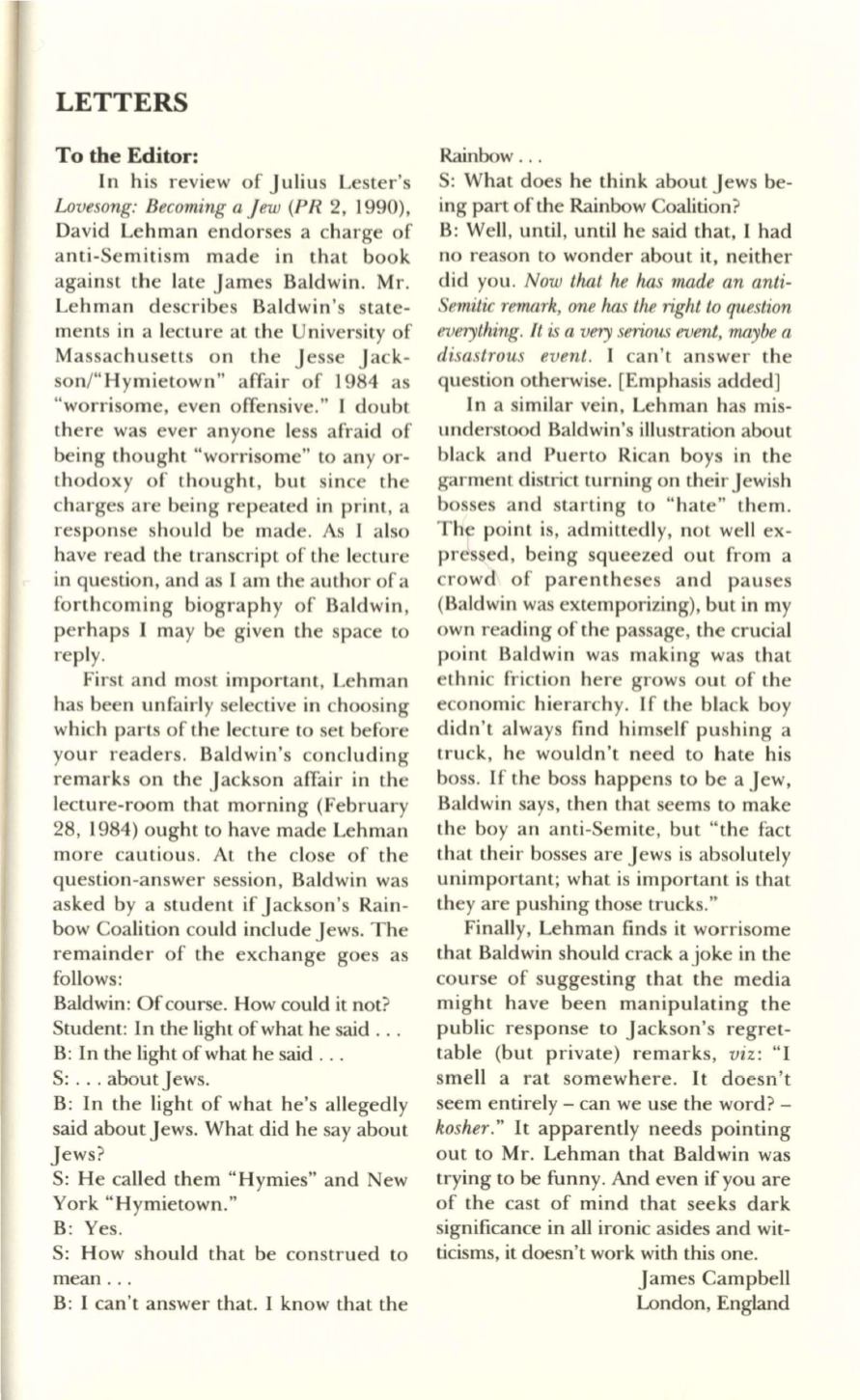
LETTERS
To the Editor:
In his review of Julius Lester's
Lovesong: Becoming a
Jew
(PR
2,1990),
David Lehman endorses a charge of
anti-Semitism made in that book
against the late James Baldwin. Mr.
Lehman describes Baldwin's state–
ments in a lecture at the University of
Massachusetts on the Jesse Jack–
sonl"Hymietown" affair of 1984 as
"worrisome, even offensive." 1 doubt
there was ever anyone less afraid of
being thought "worrisome" to any or–
thodoxy of thought, but since the
charges are being repeated in print, a
response should be made. As I also
have read the transcript of the lecture
in question, and as I am the author of a
forthcoming biography of Baldwin ,
perhaps I may be given the space to
reply.
First and most important, Lehman
has been unfairly selective in choosing
which parts of the lecture to set before
your readers. Baldwin's concluding
remarks on the Jackson affair in the
lecture-room that morning (February
28, 1984) ought to have made Lehman
more cautious. At the close of the
question-answer session, Baldwin was
asked by a student if Jackson's Rain–
bow Coalition could include Jews. The
remainder of the exchange goes as
follows:
Baldwin: Ofcourse. How could it not?
Student: In the light of what he said ...
B: In the light of what he said ...
S: ... about Jews.
B: In the light of what he's allegedly
said about Jews. What did he say about
Jews?
S: He called them "Hymies" and New
York "Hymietown."
B: Yes.
S: How should that be construed to
mean ...
B: I can't answer that. I know that the
Rainbow ...
S: What does he think about Jews be–
ing part of the Rainbow Coalition?
B: Well, until, until he said that, 1 had
no reason to wonder about it, neither
did you.
Now that he
has
made an anti–
Semitic remark, one has the right to question
everything.
It
is
a very serious event, maybe a
disastrous event.
I can't answer the
question otherwise. [Emphasis added]
In a similar vein, Lehman has mis–
understood Baldwin's illustration about
black and Puerto Rican boys in the
garment district turning on their Jewish
bosses and starting to "hate" them.
The point is, admittedly, not well ex–
pressed , being squeezed out from a
crowd of parentheses and pauses
(Baldwin was extemporizing), but in my
own reading of the passage, the crucial
point Baldwin was making was that
ethnic friction here grows out of the
economic hierarchy. If the black boy
didn't always find himself pushing a
truck, he wouldn't need to hate his
boss. If the boss happens to be a Jew,
Baldwin says, then that seems to make
the boyan anti-Semite, but "the fact
that their bosses are Jews is absolutely
unimportant; what is important is that
they are pushing those trucks."
Finally, Lehman finds it worrisome
that Baldwin should crack a joke in the
course of suggesting that the media
might have been manipulating the
public response to jackson's regret–
table (but private) remarks,
viz: "I
smell a rat somewhere. It doesn't
seem entirely - can we use the word? -
kosher."
It apparently needs pointing
out to Mr. Lehman that Baldwin was
trying to be funny. And even if you are
of the cast of mind that seeks dark
significance in all ironic asides and wit–
ticisms, it doesn't work with this one.
James Campbell
London, England


